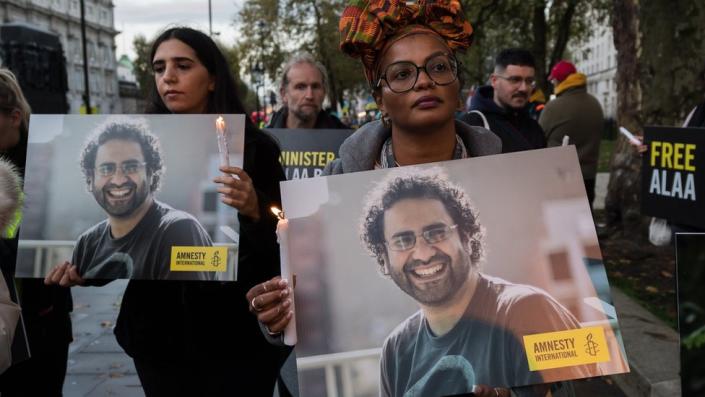
The United Nations human rights chief has called on Egypt to immediately release jailed British-Egyptian pro-democracy activist Alaa Abdel Fattah.
Volker Türk said his life was “at acute risk” after he escalated a hunger strike and stopped drinking water.
He began the strike in April to protest against the denial of consular visits.
His sister, Sanaa Seif, said: “All we know is that Alaa stopped drinking water 50 hours ago. We don’t know where he is. We don’t know if he is alive.”
“My mother waited outside the prison gates for 10 hours yesterday for her weekly letter. They didn’t give her one. She is back at those gates right now,” she told a news conference at the COP27 climate conference in the Egyptian Red Sea resort of Sharm El-Sheikh.
“I asked the British authorities to get us some proof that Alaa is alive and conscious. I did not get any response.”
UK Prime Minister Rishi Sunak stressed his “deep concern” at the case during a meeting with President Sisi in Sharm el-Sheikh on Monday and said he “hoped to see this resolved as soon as possible”, a Downing Street spokesman said.
Ms Seif also said she had been extremely worried by recent remarks by Egypt’s Foreign Minister Sameh Shoukry, who is chairing COP27, and President Abdul Fattah al-Sisi.
Mr Shoukry told CNBC on Monday that prison authorities were providing Abdel Fattah with the “healthcare and care that is available to all inmates”, while France’s president said Mr Sisi had assured him Egypt was “committed to ensuring that [the] health of Alaa Abdel Fattah is preserved”.
“Are they force-feeding my brother right now? Is he handcuffed in a bed put on IVs [intravenous therapy] against his will. This is what it sounds like to me,” Ms Seif said. “If that is the case, then he has been plunged into a worse nightmare than he was already in.”
“We know that they are happy for him to die. The only thing they care about is that it doesn’t happen while the world is watching.”
Mr Shoukry also stated on Monday that legal procedure had “not yet been fulfilled” for Egypt to recognise Abdel Fattah’s dual British citizenship, which he received last December through his London-born mother, Laila Soueif.
In a statement issued in Geneva, the UN human rights chief urged the Egyptian government to “immediately release Abdel Fattah from prison and provide him with the necessary medical treatment”.
“Abdel Fattah is in great danger. His dry hunger strike puts his life at acute risk,” Mr Türk said, describing him as one of a number of people in Egypt who had been “arbitrarily deprived of their liberty”.
But he did not limit his comments to just the British-Egyptian activist’s case.
“I call on the Egyptian authorities to fulfil their human rights obligations and immediately release all those arbitrarily detained, including those in pre-trial detention, as well as those unfairly convicted,” he said. “No-one should be detained for exercising their basic human rights.”
A representative for Egypt’s foreign minister, Wael Aboulmagd, told the BBC’s Newshour programme: “Diplomatic channels and consular channels… are open between Egypt and the United Kingdom with regard to this particular case. We are also engaging with the UN human rights system.”
Mr Abdel Fattah, a 40-year-old father of one, first rose to prominence during the 2011 uprising in Egypt that forced long-time President Hosni Mubarak to resign.
Since Mr Sisi came to power in 2014 after leading the military’s overthrow of Mubarak’s democratically elected successor, Abdel Fattah has spent most of the time in prison or police detention.
Last year, he was convicted of “spreading false news” in a Facebook post and sentenced to five years in prison. Human rights groups had called the charge spurious and the trial a sham.
In April, his family said he had begun a partial hunger strike, consuming a maximum of 100 calories a day.
Last week, with his health already fragile, he told relatives he would drink only water until Sunday, when COP27 started, and would then stop even that.




